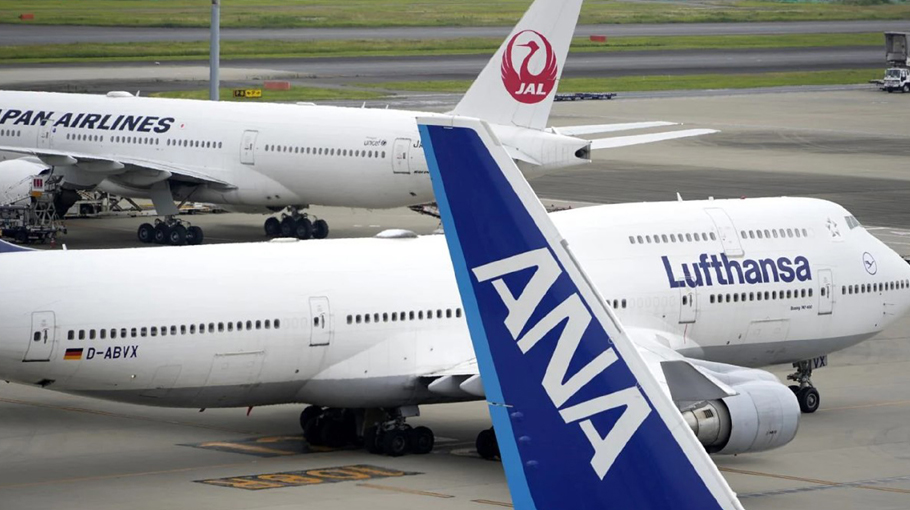Strike, labour shortages leave European airports in chaos

The long-awaited post-lockdown travel boom is rapidly turning into a bust for holidaymakers as Europe's aviation industry struggles to overcome crippling staff shortages and labour strife, forcing airlines to cancel hundreds of flights ahead of the peak summer period.
Deutsche Lufthansa AG joined other carriers this week in axing its schedule because the German airline doesn't have the staffing to cope with demand.
Lufthansa is scrapping some 900 flights in July, or 5 per cent of its typical weekend capacity, adding to snags at carriers from Air France-KLM to Ryanair Holdings Plc to British Airways, who have all struggled to sustain operations.
The chaotic scenes playing out at airports from Ireland to Germany to Turkey represent a major setback for an industry hit particularly hard in the last two years of the pandemic.
Airlines collectively lost billions in revenue that forced drastic job cuts and government-orchestrated bailouts for some carriers.
Adding to the upheaval are strikes sweeping the travel sector, with corporate leaders wary to give in to higher wage demands despite surging inflation.
"We have to look sombrely at what the summer has in store for us and how we are going to cope," EasyJet Plc Chief Executive Officer Johan Lundgren said at an aviation conference in Paris this week.
"We'll need to come together and do the best we can."
Disruptions have been particularly bad in the UK, though European hubs like Amsterdam, Frankfurt and Paris have also been plagued by delays and the fallout from strikes.
Overseas hubs have also been hit: Toronto Pearson International, Canada's busiest airport, has experienced soaring wait times and flight cancellations due to labour shortages.
Air France-KLM was forced to cancel 85 flights in one day due to a strike at Paris-Charles de Gaulle airport, and many times that number due to snags at Schiphol due to snags at Schiphol.
Scenes of angry holidaymakers stranded in long airport lines or unable to return home because their flights got cancelled at short notice represent a major setback for a sector that has looked to the coming summer holiday season as a chance to reap the benefits of surging consumer demand.
Some of the worst bottlenecks played out during the Platinum Jubilee celebrations last week that triggered an exodus of holiday-seekers and tested airports' ability to process arrivals.
Ryanair called for help from British military personnel to help deal with the disruptions. Gatwick and Manchester airports were the worst hit by flight cancellations in the lead up to the long weekend.
The prospect of even more mayhem looms for travellers as the RMT union said it plans to lead a three-day work stoppage of 50,000 rail workers later this month after failing to reach an agreement with employers over pay.
The walkout will take place on June 21, 23 and 25, the group said.
Ryanair cabin crew may go on strike this summer in several European countries.
The continent's largest low-cost airline on Thursday walked away from talks with two Spanish unions, which have joined forces with worker organisations in Belgium, France, Italy and Portugal with a plan to prepare Europe-wide action if the airline doesn't return to the table.
The chaos also extends to some of the more distant aviation markets in Europe.
Scandinavian carrier SAS AB, currently trying to get a US$3 billion (S$4.14 billion) restructuring plan over the line, now also faces a possible pilots strike.
Almost 1,000 pilots in Denmark, Norway and Sweden will plan to walk off the job later this month after they failed to reach a new collective labour agreement with the airline, local labour unions said on Thursday.
For the broader industry, the big question now is whether a sector that let go hundreds of thousands of workers at the height of the pandemic can bring them back to cope with the sharp uptick in consumer demand.
Given the demands of the jobs on offer, attracting talent won't necessarily be easy, said Mr Olivier Jankovec, the head of airports lobby ACI Europe.
"People aren't so attracted by some of the jobs we offer, especially in security and ground handling," Mr Jankovec said.
"The wages are no longer attractive enough because working conditions are what they are, people have to work in shifts and on weekends."
Many who left the industry and found jobs elsewhere are in no rush to return.
A recent jobs fair that was organised by one major airport had hoped to attract 800 candidates.
It got just four, Mr Jankovec said. And while ticket sales have roared back, aviation executives are anxious about what this means for airports and how they will be able to cope with the inflow of travellers.
Among them is Air France-KLM CEO Ben Smith, who found little reason to rejoice at near-record ticket sales that the airline booked on a recent business day.
"We're quite concerned about the readiness of airports," he said.




